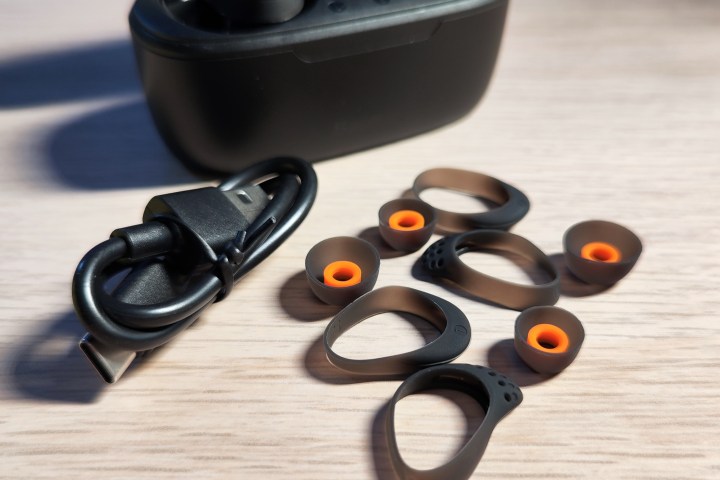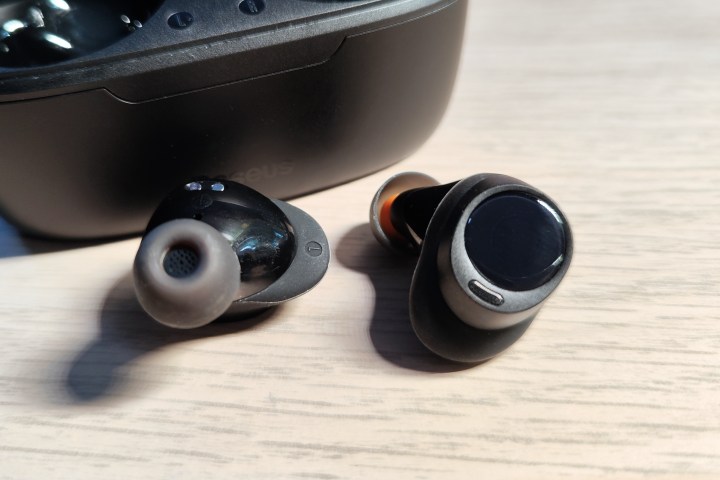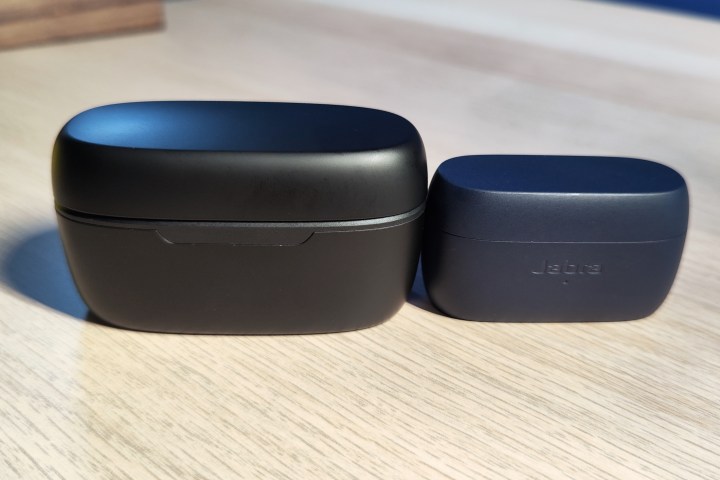Baseus Bowie MA10
MSRP $21.00
“The Baseus Bowie MA10 shatter our expectations of cheap earbuds.”
Pros
- Incredibly affordable
- Comfy and secure fit
- Decent ANC
- Surprisingly good sound
- Bluetooth Multipoint
- Excellent water resistance
- Enormous battery life
Cons
- Huge charging case
- No wireless charging
- No wear sensors
- Slightly laggy controls
I was so taken aback when I learned how much the Baseus Bowie MA10 cost — less than $30 on Amazon — that my prejudice kicked in hard. In my experience, cheap can often mean OK. But it seldom means good, and it rarely means great.
But I have to admit that these earbuds, which I’ve been testing for the past two weeks, are not only better than the Apple AirPods, they also have me questioning why anyone should spend more than $50 on any wireless earbuds.

Wild claims backed up
For the price — Amazon lists them at “retail” at $50, but you know how Amazon goes — Baseus’ claims for the Bowie MA10 are wild: hybrid active noise canceling (ANC), transparency mode, “a listening experience as immersive as being in a recording studio,” good call quality, IPX6 water resistance, customizable EQ and controls, a low-latency mode, an earbud finder, Bluetooth Multipoint, and a massive 140 hours of total battery life.
What’s even more wild is that save for the exception of the transparency mode, the Bowie MA10 get these features right. They don’t just work — they work well.
Granted, the design isn’t going to win any awards for beauty or originality, and the Bowie MA10 are standard fare for in-ear type earbuds. Their charging case is big and bulky compared to most other models — and also heavy at 3.7 ounces (the Apple AirPods 3 case weighs half that). But both the earbuds and case feel well-built. The case lid and hinge, which can often feel flimsy even on much more expensive products, are robust. Thanks to the mechanism and the magnets, the lid stays open when you need it to and snaps closed securely.

I found the earbuds surprisingly comfy and secure. Baseus includes three sizes of eartips, plus three sizes of wingtips, which help to lock the earbuds into place when you give them a twist. They may not be quite as unshakeable as an earhook-based design like on the Beats Powerbeats Pro, but they offer just as much stability as the Beats Fit Pro, so, by all means, use them for your workouts.
The Bowie MA10, like most wireless earbuds, use touch controls. With their large, smooth surfaces, the controls are easy to hit accurately, but they take some getting used to. There’s a second or so of lag time between when you tap and when you get a confirmation tone, which I found a bit annoying at first.
The controls can be customized in the Baseus app (iOS/Android). You get three gestures per earbud: double-tap, triple-tap, and a long-press. Of these, the double-tap and long-press can be assigned a different function on each earbud, but the triple-tap must always trigger the same function. This combo doesn’t give you quite enough flexibility to control everything from the earbuds. For example, if you want play/pause, track skipping, ANC control, and voice assistant access, you’ll need to forgo volume control and the ability to turn on low-latency mode, but you can definitely get by that way.
ANC isn’t up to the lofty standards set by Apple, Sony, and Bose, but it does work. You’ll notice a considerable reduction in background noise when compared to ANC-off. Better yet, it doesn’t introduce any low-level hiss, which is a common side effect of poorly implemented ANC. Wind noise can be a problem, so these might not be the best choice for running or cycling. The Baseus app even gives you a choice of ANC scenarios like commuting, indoor, and outdoor, plus a manual mode. Running in manual, with the setting on maximum, worked best for me.

Transparency mode is a mixed bag. If what you need is to be aware of your surroundings for safety purposes, it works well. If what you want is to hear your own voice clearly for conversations or phone calls, that’s definitely not the Bowie MA10’s strong suit — I found almost no difference between ANC and transparency from that point of view.
Switching ANC modes is a bit of a chore. As with the other functions, it takes a second or two to happen and you’re forced to hear a poorly recorded voice announce the mode changes (“A-N-C on/off,” “transparent,” — these can’t be disabled), And there’s no way to choose just two of these modes when switching, so you have to cycle from ANC off to transparency to ANC on and back again.
As surprising as it is to get both ANC and transparency on a set of sub-$50 earbuds, it’s even more surprising that the Bowie MA10 have Bluetooth Multipoint for connecting two devices simultaneously. A year ago, even Sony’s flagship WF-1000XM4 earbuds didn’t have this handy feature. And it mostly works exactly as it should — pause the tunes on your first device, then hit play on your second device, and the earbuds switch over seamlessly. However, I found that sometimes when connected to two devices, the earbuds would give me the double-chirp tone that indicates a second device connected long after I had performed that connection.
Excellent sound for the price
At this point, you’re probably waiting for the obvious cheap earbud pitfall: sound quality. And yet, somehow the Bowie MA10 sound far better than their price would suggest. No, they won’t make you want to abandon a premium set of earbuds, but I was shocked at how well they compared to the $100 Jabra Elite 4. The Bowie MA10 get louder, they have more powerful bass, and on tracks like Vampire Weekend’s Harmony Hall, they present a wider, more immersive soundstage. I listened to podcasts, jazz, hard rock, and pop, and all I kept thinking was, how are these things just $20 or so?

The worst thing I can say about them is that there’s a tiny bit of distortion that creeps into the midrange. But in fairness, I only noticed that after tweaking the EQ settings manually in the app (yet another feature that is a rarity on budget earbuds).
Is there more to say about the Bowie MA10? Incredibly, yes. Call quality is yet another area where these earbuds punch well above their weight. Background noise was well controlled, and the resulting compression of my voice wasn’t a major problem for intelligibility. When things got quiet, these earbuds performed really well, with clarity and almost no distortion at all.

And then there’s the battery life. With a claimed 8 hours per charge in the earbuds, that already puts the Bowie MA10 in the upper segment for wireless earbuds. But when you consider the absolutely massive power bank sitting in the charging case (it can recharge the earbuds 15 times before needing to be recharged itself), you’re just left scratching your head in wonder. Could Baseus make a smaller version with only three or four recharges in the case and put an even lower price on them? That prospect boggles the mind. Oh, and there’s also a rapid-charge feature that will extend listening time by two hours after 10 minutes.
The Baseus app will also let you keep tabs on your earbuds’ location and get them to emit a loud beeping sound to help you find them under a couch cushion.

You can’t go wrong
There are two quick caveats that are worth mentioning. First, that price. When Baseus reached out to me, it said the Bowie MA10 cost $21. And yet, both Amazon and Baseus’ website list the regular price of the Bowie MA10 as $50. Amazon then shows a limited-time deal price of $27, which can be further reduced to $21 with a coupon. This gave me pause — can we really say these are $21 earbuds if such deep and limited-time discounts are how we get to that price? However, my contact at Baseus assured me that the company intends on keeping these discounts active indefinitely. Worst-case scenario, should Amazon prevent the coupon portion from continuing, I wouldn’t change my opinion on the value here even if the price were $27.
Second, the earbuds have a bit of a quirk when it comes to powering them down. In order to fully turn them off and disconnect them from your phone, they must be seated correctly in the charging case, and the lid must be closed. If either of these isn’t true, they won’t power down.
Even if the Bowie MA10 only had some of the features and performance they offer at double the price, they’d be a helluva good value. But given that they far exceed any other earbuds at this price, if you’re looking for an ultra-affordable set of wireless earbuds and you don’t mind their big charging case, you just can’t go wrong.
Editors’ Recommendations

